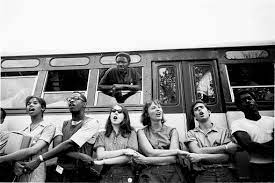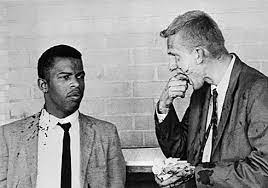
I caught the tail end of a documentary on PBS the other night about the Civil Rights movement, more specifically, the Freedom Riders. I tuned in just as they were discussing one of the Freedom Riders infamous Greyhound bus rides to Alabama. A bus ride in which the Riders security was not only guaranteed by the state of Alabama, but also the federal government and the owner of the Greyhound bus line. But when the bus of Freedom Riders arrived, there was no support to be found. Some of the riders discussed the eerie silence in the air. Moments later they describe the sounds of a mob approaching - armed with crowbars, pipes, bats and other converted weapons of destruction. An obvious fear overcame the Riders. They struggled with their limited choices. They knew that getting off of the bus would almost surely lead to their demise, or at minimum, a frightful attempt. It was at that point that James Zwerg, a white Freedom Rider who’d committed his life to the movement, decided that he would be the first one off of the bus - much to the dismay of his fellow Freedom Riders. As Zwerg exited the bus into the mob, he was pulled into the mob - and all of the hatred that existed in the South when a white man defended the Civil Rights of black Americans was unleashed upon him. The crowd was so enraged with his gaul, that he became their main focus, which allowed the other Riders to exit the bus and run for their lives.
This was the first time that I’d heard of him. At that point all I knew was that I wanted to know more.
James Zwerg was born in Appleton, Wisconsin. He was very involved in school, and began participating in student protests in high school. He was also very active in the Christian church. It was through his religious beliefs that he became involved and committed to the Civil Rights movement. He was taught and believed that all people are created equal, regardless of race or religion. He was one of a handful of white Christians at the time to support the movement. He attended college at Beloit College where he studied Sociology, and grew his commitment to the Civil Rights movement. In part due to his roommate at the time, a black man from Alabama, Robert Carter. Zwerg recalls “I witnessed prejudice against him…we would go to a lunch counter or cafeteria and people would get up and leave the table. I had pledged a particular fraternity and then found out that he was not allowed in the fraternity house. I decided that my friendship was more important than that particular fraternity, so I depledged.”
In 1961 Zwerg participated in a one semester student exchange program at Nashville’s Fisk University, a predominantly black school. It was there that he met John Lewis - and was immediately impressed by his demeanor and his deep commitment to the movement. At that time John Lewis was a member if SNCC (Student Nonviolent Coordinating Committee - a student organized activist group committed to nonviolent direct action. Zwerg joined SNCC. Soon thereafter he recommended that they group attend a movie - although the bulk of the members, knowing that theaters were segregated, weren’t especially keen on the idea. In one of his first tests, Zwerg was to buy two movie tickets - one for himself, and one for a black man. When they attempted to enter the theater in 1961, he was hit with a monkey wrench and knocked unconscious.
Later that same year CORE (Congress of Racial Equality) began to organize Freedom Rides. The first involved thirteen black and white Riders who rode into the South to challenge the grossly discriminative environment. When they reached their destination in Anniston, Alabama, one of the buses was ambushed and attacked. Hearing of the situation, SNCC decided to send reinforcements. Zwerg was the only white man in the group, and although he was scared for his life, he never had second thoughts. He recalled “My faith was never so strong as during that time. I knew I was doing what I should be doing.” The group made their way to Birmingham where Zwerg would be arrested for not moving to the back of the bus with his black companion.
A few days later the Freedom Riders regrouped and headed to Montgomery - with the guarantee of safety from the state of Alabama, the federal government and the Greyhound station administration. When they arrived, there was no security to be found - and the environment was described as ‘eerily silent’. As aforementioned, it was at this moment that Zwerg said he would exit the bus first - into the growing violent mob. As he exited the bus he was hit with his own suitcase, knocked down and pummeled by the group. He was beaten to the point of unconsciousness. As he regained consciousness, leaning on a platform handrail for support to pull himself up, a white man through him over the rail. He landed head first. Zwerg was the first beaten that day, but the attack on him was seen as the most ruthless. Zwerg recalled, "There was nothing particularly heroic in what I did. If you want to talk about heroism, consider the black man who probably saved my life. This man in coveralls, just off of work, happened to walk by as my beating was going on and said 'Stop beating that kid. If you want to beat someone, beat me.’" And they did just that. He was still unconscious when Zwerg left the hospital, and Zwerg reported that he never knew if this man lived or died.
Zwerg remained unconscious for two days, and in the hospital for five. His post riot photos were published in numerous periodicals across the country. After the experience, Zwerg claimed that he had an incredible religious experience, and that God helped him to not fight back. In an interview decades later Zwerg recalled, ”In that instant, I had the most incredible religious experience of my life. I felt a presence with me. A peace. Calmness. It was just like I was surrounded by kindness, love. I knew in that instance that whether I lived or died, I would be OK.”
In a speech I saw in the documentary, soon after he regained consciousness, and while still in the hospital, Zwerg stated, "Segregation must be stopped. It must be broken down. Those of us on the Freedom Ride will continue.... We're dedicated to this, we'll take hitting, we'll take beating. We're willing to accept death. But we're going to keep coming until we can ride from anywhere in the South to any place else in the South without anybody making any comments, just as American citizens.”
Later that same year, 1961, Martin Luther King presented Zwerg with the Southern Christian Leadership Conference Freedom Award.
Zwerg continues to this day to spread awareness about the trials and tribulations of the Freedom Riders, and how the answers are only found in love. He remains a devoted Christian. At the closing of one of his most recent interviews, he states, “I think the thing I would add is love is still the most powerful force in the universe. Hatred will never beat it. Violence will never beat it.”
I learned about James Zwerg by happenstance. The timing, however, couldn’t have been better. Divine intervention? Maybe.
What I do know is that the topic of ‘white privilege’ is becoming increasingly present in the conversations around equality, and more importantly, equity. When we’re having these conversations, however, it it imperative that we remember people like James Zwerg. People who in my estimation, forewent their privilege and risked their lives, to help effect real change.
It wasn’t and isn’t black versus white. It is and always has been wrong versus right.
As evidenced by his life and actions - it’s only a committed love for all that truly impacts change. And you can’t tell who’s committed to change solely based on the color of their skin, or their implied privilege - only by their hearts and actions - which you can never understand if you blanket folks in the assumption of privilege. Zwerg demonstrated, along with countless other white allies who remain nameless to this day, and may never be remembered for their commitment over the years, yet knowingly risked their lives to move the needle of equality forward - that one has to be truly open to unbridled love - which knows no color or bounds.
This is the only way forward.
__________________________________________________________________________________
Other resources cited in this blog:
Gonzalez, Tony (May 31, 2013). "Accidental Advocate Looks Back". Appleton Post Crescent. pp. A1, A4.
"Transcript: Eyes on the Prize, America's Civil Rights Movement, 1954-1985". PBS. August 23, 2006.
"LISA, SIMEONE. "Interview: John Lewis And Jim Zwerg Discuss The 40Th Anniversary Of The Freedom Riders."





Comments